#Low voting in Pakistan
Text
Pakistan Elections: The ‘Militablishment’ May Have Won The Battle, But Is It Losing The War?
“Pakistan’s multiple socio-economic and geographic challenges will only worsen if the country’s powerful military continues to try to control the nation’s decision-making processes”
Ershad Mahmud*
The recent general elections in Pakistan, the results of which are yet to be finalised, gave birth to distinct themes, echoing with clarity and significance. Among these, a resounding message becomes…
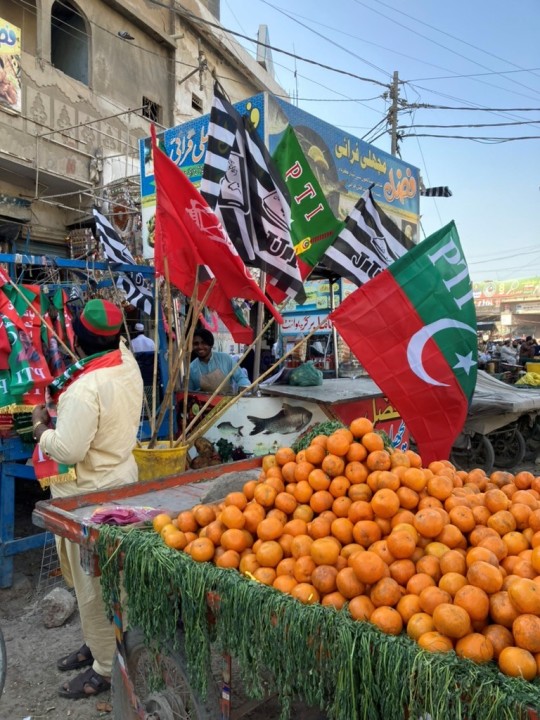
View On WordPress
#Balochistan#Election Day in Pakistan#Geographic challenges#Imran Khan#Khyber Pakhtunwa#Low voting in Pakistan#Military Leadership#MQM#Pakistan General Elections#Pakistan Military Establishment#PML-N#PPP#PTI#Punjab#Sapan News#Shehbaz Sharief#Sindh#Socio-economic challenges
0 notes
Text
Ladies, vote for yourself and those denied the right
Dhurnal (Pakistan) (AFP) – Perched on her traditional charpai bed, Naeem Kausir says she would like to vote in Pakistan's upcoming election -- if only the men in her family would let her.
Issued on: 05/02/2024 - 08:41
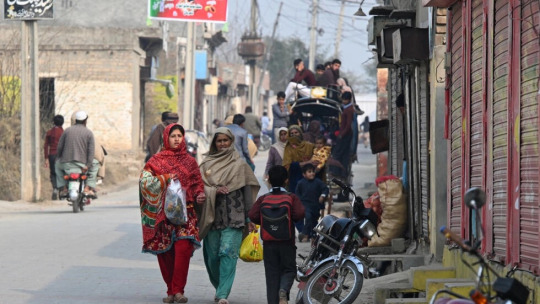
In the village of Dhurnal in Punjab, spread across crop fields and home to several thousand people, men profess myriad reasons why women should not be allowed to vote © Farooq NAEEM / AFP
Like all the women in her town, the 60-year-old former headmistress and her seven daughters -- six already university educated -- are forbidden from voting by their male elders.
"Whether by her husband, father, son or brother, a woman is forced. She lacks the autonomy to make decisions independently," said Kausir, covered in a veil in the courtyard of her home.
"These men lack the courage to grant women their rights," the widow told AFP.
Although voting is a constitutional right for all adults in Pakistan, some rural areas in the socially conservative country are still ruled by a patriarchal system of male village elders who wield significant influence in their communities.
In the village of Dhurnal in Punjab, spread across crop fields and home to several thousand people, men profess myriad reasons for the ban of more than 50 years.
"Several years ago, during a period of low literacy rates, a council chairman decreed that if men went out to vote, and women followed suit, who would manage the household and childcare responsibilities?" said Malik Muhammad, a member of the village council.
"This disruption, just for one vote, was deemed unnecessary," he concluded.
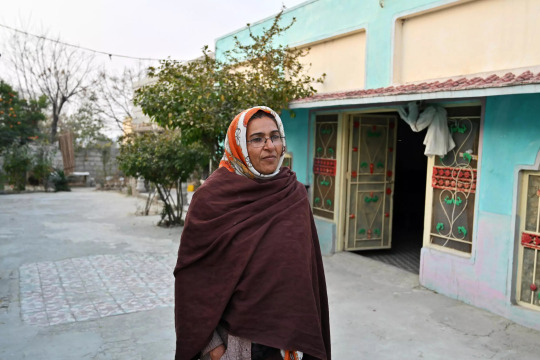
Robina Kausir, a healthcare worker, talks to AFP in Dhurnal of Punjab province, ahead of the upcoming general election © Farooq NAEEM / AFP
Muhammad Aslam, a shopkeeper, claims it is to protect women from "local hostilities" about politics, including a distant occasion that few seem to remember in the village when an argument broke out at a polling station.
Others told AFP it was simply down to "tradition".
First Muslim woman leader
The Election Commission of Pakistan (ECP) has stressed that it has the authority to declare the process null and void in any constituency where women are barred from participating.
In reality, progress has been slow outside of cities and in areas that operate under tribal norms, with millions of women still missing from the electoral rolls.
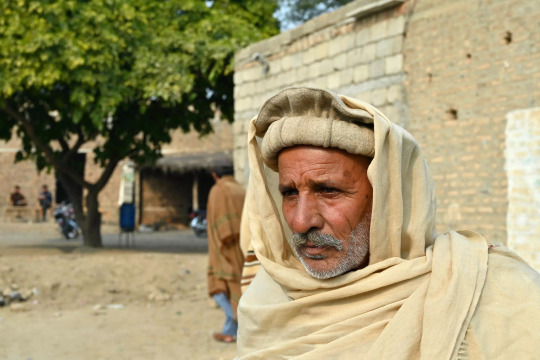
Muhammad Aslam, a shopkeeper, claims a ban on women voting is to protect them from "local hostilities" about politics © Farooq NAEEM / AFP
The elders in Dhurnal rely on neighbouring villages to fill a government-imposed quota which maintains that 10 percent of votes cast in every constituency must be by women.
Those who are allowed to vote are often pressured to pick a candidate of a male relative's choice.
In the mountainous region of Kohistan in Khyber Pakhtunkhwa province home to almost 800,000 people, religious clerics last month decreed it un-Islamic for women to take part in electoral campaigns.
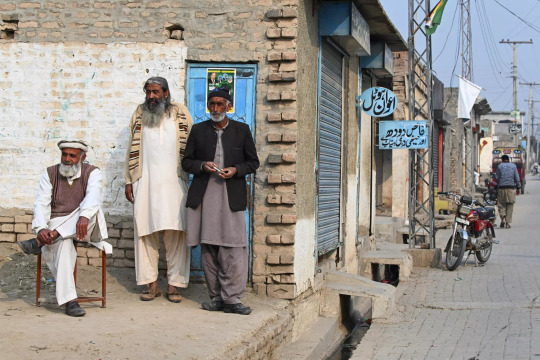
Although voting is a constitutional right for all adults in Pakistan, some rural areas in the socially conservative country are still ruled by a patriarchal system of male village elders who wield significant influence in their communities © Farooq NAEEM / AFP
Fatima Tu Zara Butt, a legal expert and a women's rights activist, said women are allowed to vote in Islam, but that religion is often exploited or misunderstood in Pakistan.
"Regardless of their level of education or financial stability, women in Pakistan can only make decisions with the 'support' of the men around them," she said.
Pakistan famously elected the world's first Muslim woman leader in 1988 -- Benazir Bhutto, who introduced policies that boosted education and access to money for women, and fought against religious extremism after military dictator Zia ul-Haq had introduced a new era of Islamisation that rolled back women's rights.
However, more than 30 years later, only 355 women are competing for national assembly seats in Thursday's election, compared to 6,094 men, the election commission has said.
Pakistan reserves 60 of the 342 National Assembly seats for women and 10 for religious minorities in the Muslim-majority country, but political parties rarely allow women to contest outside of this quota.
Those who do stand often do so only with the backing of male relatives who are already established in local politics.
"I have never seen any independent candidates contesting elections on their own," Zara Butt added.
'Everyone's right'
Forty-year-old Robina Kausir, a healthcare worker, said a growing number of women in Dhurnal want to exercise their right to vote but they fear backlash from the community if they do -- particularly the looming threat of divorce, a matter of great shame in Pakistani culture.
She credits part of the shift to access to information as a result of the rising use of smartphones and social media.
"These men instil fear in their women – many threaten their wives," she told AFP.
Robina, backed by her husband, is one of the few prepared to take the risk.
When cricketing legend Imran Khan swept to power in the 2018 election, Robina arranged for a minibus to take women to the local polling station.
Only a handful joined her, but she still marked it as a success and will do the same on Thursday's election.
"I was abused but I do not care, I will keep fighting for everyone's right to vote," Robina said.
#pakistan#Every vote counts#Men making up bs to prevent women from voting#Election Commission of Pakistan (ECP)#Men protecting women........from exercising their right to vote#Benazir Bhutto#only 355 women are competing for national assembly seats in Thursday's election compared to 6094 men
30 notes
·
View notes
Text
The UN Chief has invoked Article 99 of the charter, something that has not been done since 1971, during a particularly bloody phase of India-Pakistan fighting that resulted in the establishment of Bangladesh.
It calls for an immediate ceasefire under international law, to be voted on by the Security Council.
A couple things could happen:
-If the US votes it down or vetos, it signals what I think is the end of international rule since WWII. A single country being able to stop enforcement of international law to at the highest order so that a genocide may continue would be a death knell to the flimsy frame upholding current international politics and decorum.
-If the US does not somehow block this move, Israel potentially could be charged with war crimes if they continue to fire upon Gaza. It’s unclear what will happen from there, since that is a long process and over 17,000 are already dead in Gaza in less than 60 days.
In any case, I suspect that Netanyahu is being set up to be the fall guy for all of Israel’s actions. A couple far right cabinet members may go with him. Think, essentially, what is happening to Trump or what did happen to Milosevic. The occupationist establishment is willing to sacrifice an aging maniac to avoid any real consequences to Israel as a whole. This gives them time to continue expanding into the West Bank, control Gaza so it remains a disaster zone, and wait for an opportunity to push further next time Hamas or another entity that arises from this dares to fight back.
Netanyahu’s government already responded, saying a ceasefire is unacceptable and calling the UN Sec. General’s letter is a “new moral low” and shows their “bias” against Israel, that they will not stop until Hamas is defeated (something that is very unlikely through military action and is really an excuse to commit genocide, kill UN officials, kill journalists, and destroy civil and resistance infrastructures.)
Don’t stop taking about Palestine. Don’t stop talking about Sudan. Bring attention to these atrocities and demand action / donate to relief / spread the word / protest in any way you can.
29 notes
·
View notes
Text
"All human beings are born free and equal in dignity and rights," according to Article 1 of the United Nations Universal Declaration of Human Rights. The job of the UN Human Rights Council is to monitor countries' compliance with this fundamental tenet, ensuring that people can live free from persecution, torture and discrimination.
Several of the countries currently serving as the guardians of global human rights, however, have a poor track record at home — chief among them China, the United Arab Emirates and Eritrea.
In recent years, human rights violations such as reeducation camps, torture and arbitrary arrests, as well as forced labor and suppression of the opposition, have been documented in these countries.
As the number of authoritarian regimes has grown globally, their presence on the Human Rights Council has increased. China, in particular, has exploited this by leaning on allies to vote — or abstain from voting — in favor of its national interests.
Council members becoming less democratic
In 2023, only 30% of the countries on the Human Rights Council were classified as "free" by the US think tank Freedom House. For its annual Freedom in the World report, the organization examines whether governments provide free elections and meet certain minimum standards for political rights and civil liberties, such as freedom of assembly. A total of 70% of the current council members were classified as "partly free" (such as India) and "not free" (Sudan and other countries).
Each year, the Human Rights Council elects one-third of its 47 members to three-year terms according to fixed geographic quotas based on the number of UN countries per region: The Asia-Pacific and Africa groups have 13 members each, the Western Europe and North America group has seven, Eastern Europe has six, and the Latin America and Caribbean group has eight.
Elections for terms running from 2024 through 2026 are anticipated in October. The candidates include Cuba, Kuwait and Russia, which was removed from the council in 2022 following its full-scale invasion of Ukraine.
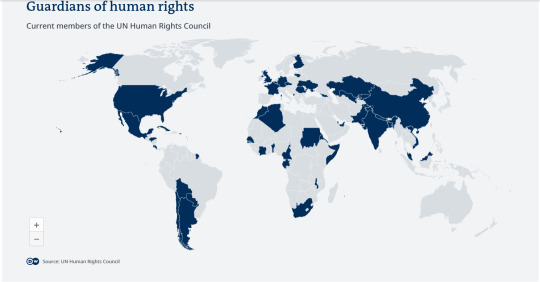
Researchers from organizations such as Freedom House, V-Dem and Democracy Matrix attempt to quantify members' adherence to minimum international humanitarian standards such as guarantees for civil liberties and compliance with prohibitions on torture.
The human rights score of the countries that have been sent to the council since its inception in 2006 has declined considerably. In 2023, it is only just above the historic low of 2022.

"This unwelcome development is not only evident in the council but worldwide," said Silke Voss-Kyeck, a research fellow at the German Institute for Human Rights. "Many members are governed in an authoritarian and dictatorial manner." Compliance with human rights obligations seldom plays a role in the election of council members, she said.
'China has Africa in its pocket'
One consequence of the rise of autocratic regimes is that Human Rights Council votes often pit blocs against each other, said Yaqiu Wang, senior researcher on China at Human Rights Watch. Unlike the Cold War, however, the driving factor here is not a shared ideology, she said.
"It's more interest-based," said Wang. Pakistan, for example, often votes with China because economic ties are strong and Pakistan sees China as an ally against an adversarial India. "It's like a trade: 'If you vote with me, I will go with you.'"
In addition to Asian countries, Wang said, China has especially relied on African governments for support on the Human Rights Council. "I don't think any particular country has stood up to China — except Somalia, which recently rejected demands," Wang said, referring to the Horn of Africa country's vote for a 2022 resolution that addressed human rights abuses in reeducation camps in Xinjiang. "China has Africa in its pocket."
A unifying element, Wang said, is a rejection of Western dominance. "There's a history of Chinese-African solidarity," Wang said, "an alliance against the Western imperialism." China is building on that — and on economic interdependencies.
Cultivating unlikely alliances
China has had less success bringing Latin American governments under its sway. Countries such as Costa Rica are economically more self-sufficient than many African nations. Moreover, South American governments are more democratic, according to the Freedom House Global Freedom Score, and therefore less susceptible to China's influence.
Unlike in many African countries with authoritarian governments, for example, it's not enough to "ensnare" the elites, Wang said. That's because in democracies elites are often replaced through elections.
Unlike the UN Security Council, which is unable to act on the war in Ukraine because Russia has exercised its veto power on votes to address the conflict, the Human Rights Council is not blocked.
Resolutions reprimanding specific countries for human rights violations have increased since the council's founding in 2006. Country-specific resolutions are intended to pressure the respective governments to address the issues or face additional loss of reputation, sparking heated debates among members of the Human Rights Council.
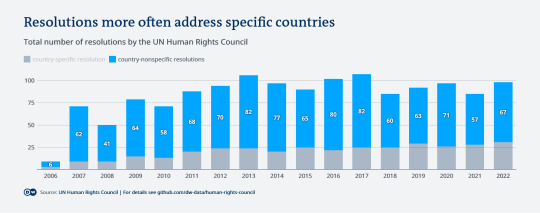
The countries most often mentioned in resolutions brought before the Human Rights Council are Syria, Congo, Israel, Mali, Myanmar, Sudan and Yemen. Despite its own well-documented human rights abuses, China has not been on the losing end of a country-specific resolution. So far, there has only been one such effort: A resolution to condemn the UN-documented reeducation camps for Uyghur Muslims in China's western Xinjiang region failed in 2022, with 17 votes for, 11 abstentions and 19 votes against — including by Indonesia, Pakistan, Namibia and China itself.
'China goes ballistic after the vote'
Wang said China used not-so-subtle coercion to maintain support in the Human Rights Council. "It is intimidating," she said. "It threatens veiled. Before a vote, it's like a Chinese diplomat in another country, let's say Chile, just to give an example, he tells Chile: 'You know, you have to vote this way. Otherwise, you don't want to undermine the economic ties between Chile and China, right?'" Should a country not comply with such demands, Wang said, "China goes ballistic after the vote."
Voss-Kyeck confirmed that China's government uses pressure to get what it wants. "High Commission staff and diplomats are being threatened — personally, but also politically," she said. "It's all well-documented. People are getting evening phone calls to private numbers." No country, she said, is as aggressive as China in attempting to avoid criticism.
The efforts of China and its allies to prevent critical resolutions are evidence of their desire to avoid censure by the council. Only Russia has given up on trying to evade condemnation. "They've become such an outsider," Voss-Kyeck said. "They don't care about the council."

Though countries such as China are able to use alliances to diminish the Human Rights Council's oversight efforts, the work of the UN body is important, Voss-Kyeck said, and its "impact is great." One example is its importance to domestic civil society movements and Indigenous groups.
"That doesn't exist in any UN body: that Indigenous people are allowed in the room, that they have the right to speak, to make statements," said Voss-Kyeck. "That's a thorn in the side of many states."
Limited options for reforming Human Rights Council
Despite the stated purpose of the council, the body's current structure prevents it from being effective in the fight against human rights violations. Too often, countries are both the defendants and judges in the cases of their own violations — and they have little interest in judging themselves.
Though critics of the council agree that changes are needed to restore the body to its intended purpose, many have long been skeptical about specific proposals— such as limiting membership to countries that have ratified certain human rights treaties. "Of course, you can make a court only by the good guys, who then judge the bad guys," said Voss-Kyeck. "But the question is: What effect does that then still have on the 'bad guys'? And who decides who are the bad guys, who are the good guys?"
Wang also worries that making changes to the structure of the Human Rights Council could ultimately weaken the body. "Reforming the HRC can be risky," she said, "given we do not know the outcome of putting it all back on the negotiation table."
10 notes
·
View notes
Text
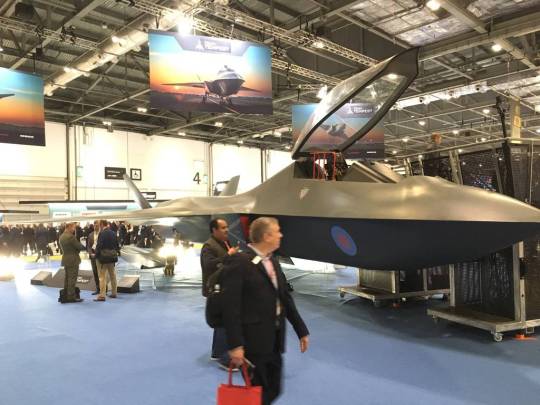
Tempest program and Russian invasion boost the growth of Italy's defense budget
Diego Alves By Diego Alves 07/27/2022 - 17:00 in Military, War Zones
Italy increased defense spending again by investing more resources in the Tempest fighter program in 2022 and radically updates its forecast for its total spending on the sixth generation fighter program.
The recently released 2022 budget includes €18 billion ($18.4 billion) in Ministry of Defense spending, above the €16.8 billion spent in 2021, which in turn was an increase over previous years.
The share of the budget for purchases is 5.42 billion euros, a jump of 34% from the 4 billion euros spent in 2021.
An image of shopping expenses should include the annual replacement for "domestic" purchases provided by the Italian Ministry of Industry, which reaches €2.43 billion, a slight drop from last year's €2.7 billion.
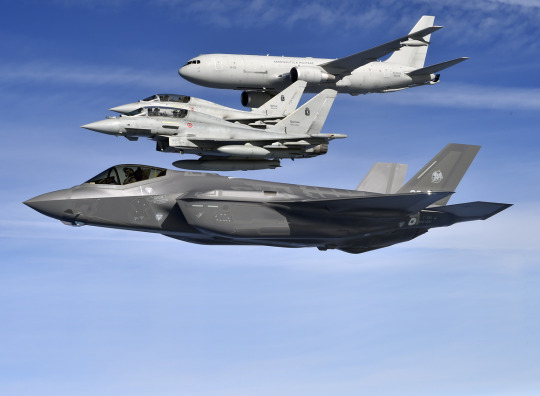
The integration of the F-35's advanced capabilities shows how the Allies bring their cutting-edge technology and support NATO's lasting defensive mission in the region and against the most modern opposing aircraft.
This year's general purchases total 7.85 billion euros, above last year's 6.76 billion euros, which in turn was above 5.45 billion euros in 2020.
In his introduction to the budget document, Italian Defense Minister Lorenzo Guerini said that the Russian invasion of Ukraine has made preparation for conventional war a priority.
"In this context, there can be no doubt about the need to follow the growth trajectory of defense spending," he wrote.
The document predicted that the upward trend in purchasing spending would stop next year, with an expected total disbursement of € 6.18 billion.
The document calculated that defense spending this year, including the reinforcement of the Ministry of Industry and funds voted separately to cover military missions abroad, total €21.58 billion.
One program that benefited from a large increase in funding was Tempest hunting, which unites Italy with the United Kingdom and Sweden.

The Italian Department of Defense confirmed the acquisition of a total of 90 Lockheed Martin F-35A/B fighters, the allocation initially desired by the European country. Previously, Italy had foreseen a reduction in the order for F-35 fighters.
After forecasting annual spending in 2022 and 2023 last year of 20 million euros per year, the new budget commits 220 million euros this year and forecasts 345 million euros next year.
Last year, the budget document predicted an overall expenditure of €2 billion on the program - this year, planners revised this estimate to €3.8 billion by 2036. The document predicts that the money will begin to "flow" next year for the acquisition of two of the three amphibious ships planned for the Italian Navy, with a life budget planned for the program of €1.2 billion by 2036.
Interest is also growing in a new tracked combat vehicle to replace Italy's Dart vehicles. Last year, the budget document said that Italy expected to spend 2.14 billion euros on the program. This year, the forecast rose to €3.74 billion, with expenses expected to start in 2024 and last 13 years after Italy decides on international partners.
Other expenses this year include €510 million on new U-212NFS submarines, €1.4 billion in the Eurofighter program and €1.27 billion in Italy's F-35 purchasing program.
Tags: AMI - Italian Military Aeronautics/Italian Air ForceMilitary AviationItalian Military MarinaTempest
Previous news
Czech Air Force chooses F-35A Lightning II
Next news
Russia will leave the ISS project after 2024
Diego Alves
Diego Alves
Related news
BRAZILIAN AIR FORCE
VIDEO and IMAGES: New KC-30 aircraft is incorporated into the Brazilian Air Force
07/27/2022 - 10:33 PM
MILITARY
Czech Air Force chooses F-35A Lightning II
07/27/2022 - 3:00 PM
Photo by Jeremy de Winter (via Jetphotos.com)
MILITARY
Pakistan buys seven C-130H Hercules aircraft from Belgium
07/27/2022 - 1:00 PM
A Eurofighter Typhoon takes off with its activated afterburners.
MILITARY
UK MoD pays £423,000 in compensation for "low flight"
07/27/2022 - 08:00 AM
MILITARY
Surveillance missions triple in England
07/26/2022 - 4:00 PM
The F-15EX Eagle II fires an AIM-120D missile during a test mission near Eglin Air Base, Florida, on January 25, 2022. The F-15EX can contain up to 12 AIM-120D missiles. (Photo Tech. Sgt. John Raven USAF)
MILITARY
Japan buys 150 AIM-120C-7/C-8 missiles
07/26/2022 - 2:00 PM
HOME Main Page Editorials Information Events Collaborate SPECIALS Advertise About
Cavok Brasil - Digital Tchê Web Creation
Commercial
Executive
Helicopters
History
Military
Brazilian Air Force
Space
SPECIALS
Cavok Brasil - Digital Tchê Web Creation
1 note
·
View note
Text
Independent Candidates Aligned With Imran Khan Surge in Pakistan's Election! Corrupt to Their Cores Pakistani Army’s Generals Are Busy in Rigging To Change the Results
PTI, led by Imran Khan, can't run as a bloc in the elections, but unofficial counts show independent candidates, supported by PTI, leading in most areas.
— TRT World | Friday February 19, 2024
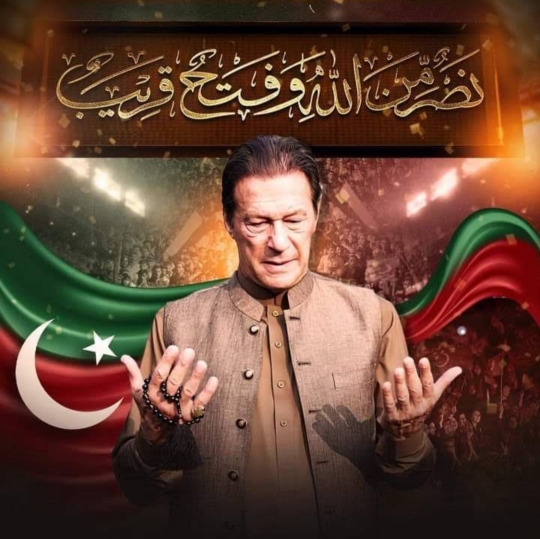
The One & Only, The Legend of Legends, Chairman Political Party PTI and Illegally Ousted Former Prime Minister of Pakistan: IMRAN KHAN! He is Illegal Jailed By the Corrupt to their Cores, Looter, Traitor, Boak Bollocks Army Generals
Businessman Imran Sheikh, 52, registers to vote at a polling station in a school on the day of the general election, in Islamabad, Pakistan / Photo: Reuters
Independent candidates linked to jailed former prime minister Imran Khan were outperforming expectations in early tallies from Pakistan's election, after a long delay in results added to accusations of poll rigging.
Khan's Pakistan Tehreek-e-Insaf (PTI) was barred from contesting Thursday's election as a bloc, but unofficial tallies on Friday by local TV channels showed independent candidates — including dozens anointed by his party — leading in most constituencies.
By 9:00 am (0400 GMT) — more than 16 hours after polling stations closed — the Election Commission of Pakistan (ECP) had announced just 13 National Assembly results.
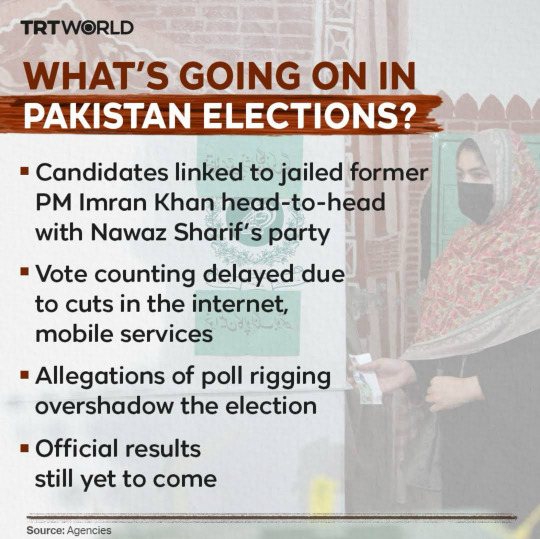
Five had gone to independent candidates linked to PTI, four to the Pakistan Muslim League-Nawaz (PML-N), and four to the Pakistan Peoples Party (PPP).
"There was a sense of certainty about the outcome," Sarah Khan, an assistant professor of political science at Yale University, told AFP.
"That sense of certainty got upset very early on," she added. "It's definitely not the foregone conclusion that anybody thought it might be."
Before the first results were officially announced, PTI chief organiser Omar Ayub Khan said he was confident the party had done enough.
"Pakistan Tehreek-e-Insaf-backed independent candidates have the ability to form the next federal government with a two-thirds majority," he said in a video statement released to the media.
The PML-N had been expected to win the most seats following Thursday's vote, with analysts saying its 74-year-old founder Nawaz Sharif had the blessing of the military-led establishment.
Party spokeswoman Marriyum Aurangzeb said they were still hopeful of taking the largest province of Punjab, crucial to forming a government.
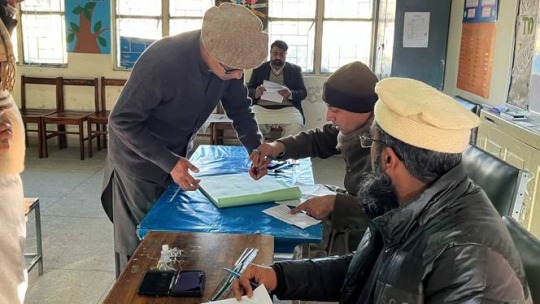
Businessman Imran Sheikh, 52, registers to vote at a polling station in a school on the day of the general election, in Islamabad, Pakistan / Photo: Reuters
Rigging Fears
Michael Kugelman, director of the South Asia Institute at the Woodrow Wilson International Center for Scholars in Washington, told AFP the delay "suggests that the powers that be are trying to create an environment that allows them to more easily be involved in the electoral process".
"Vote tampering and rigging fears are rife, and for good reason," he said more bluntly on X.
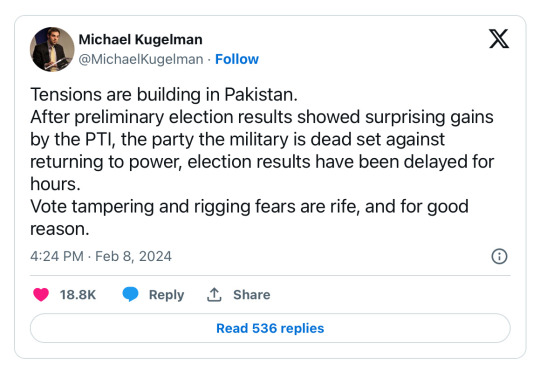
Pollsters predicted a low turnout from the country's 128 million eligible voters following a lacklustre campaign overshadowed by the jailing of Khan, and the hobbling of PTI through court orders, a ban on rallies, and the harassment of party leaders.
Allegations of poll rigging overshadowed the election, as well as authorities' voting day shutdown of the country's mobile phone network –– ostensibly on security grounds.
Digital rights activist Usama Khilji said the mobile service blackout "strengthens the popular perception that the elections are rigged by the deep state".
Raoof Hasan, PTI's secretary for information, said in a video statement that party agents in the field had reported PTI candidates leading in 125 constituencies.
"An effort may be afoot to tamper with the results," he said of the delay in announcements from ECP headquarters.
#TRT World 🌎#Pakistan’s Elections#Rigging at Peak By Corrupt Army Generals#Imran Khan | PTI | Independent Candidates | Winning | Large Margins
0 notes
Text
Hoping for a turnaround, minorities of city’s neglected localities cast vote - Newspaper
Hoping for a turnaround, minorities of city’s neglected localities cast vote – Newspaper
KARACHI: The turnout of voters belonging to religious minorities remained low as, what is being described as an ‘election settlement drama’ between the ruling Pakistan Peoples Party and the Muttahida Qaumi Movement-Pakistan appears to have kept Karachiites confused about the local government polls till the eleventh hour.
However, despite an unusually cold winter weather some ‘diehard elders or…
View On WordPress
0 notes
Text
Branded SMS Marketing


Why use Text Marketer for your Bulk SMS?
• All the Pakistan Run SMS Marketing Campaigns

• Buy and Sale your new & used cars by SMS Marketing Pakistan
• Buy and Sale your property in Pakistan by SMS Marketing Pakistan
• Sending SMS Alerts by SMS Marketing Pakistan
• Sending SMS Notifications by SMS Marketing Pakistan
• Polling SMS (for Voting) by SMS Marketing Pakistan
• Sale your services by SMS Marketing Pakistan
• Product Launch SMS by SMS Marketing Pakistan
• Sending Promotions SMS to your customers by SMS Marketing Pakistan
• Sending Announcements SMS by SMS Marketing Pakistan
• Sending SMS Reminders to your Client by SMS Marketing Pakistan
• Sending SMS Greetings by SMS Marketing Pakistan
Available List of Mobile Numbers Data.
We can send your Marketing Messages to your Clients or we can also Sending your Marketing SMS
with our Exclusive & 100% Accurate Mobile Number Databases.
What Adsaim Provide :
• Cheaper Rates
• Fast Message Delivery
• Quick Response
• Delivery Report is delivered to our client
• You can sell your product , services etc (More than One hour)
• Related to your business Sending SMS
• One-time charges
• sending and receiving Delivery Report Option is also available.
Branded Name SMS :
- Easy to use web interface
- Choose any brand name of up to 11 characters Like (ALERTSMS)
- Each SMS can have up to 160 characters
- The facility of sending Urdu SMS
- Send SMS Campaign any time 24/7
- Fast SMS sending speed.
- No hardware/software is required on the client’s part
- Import mobile numbers list from any source
- Complete SMS sending history and status report
- Send to any mobile network in Pakistan
- No hidden charges, low prices & longer validity
- Integrate our solution to your software/website
Price List For Branded SMS
QTY
RUPEES
Masking
1,500
1500/-
No
3,000
2850/-
No
5,000
4500/-
No
10,000
8500/-
Yes
50,000
40,000/-
Yes
100,000
75,000/-
Yes
200,000
140,000/-
Yes
500,000
325,000/-
Yes
100,0000
500,000/-
Yes
2 working days process
Complete Delivery Report
zong, warid, telenor, ufone, jazz Masking
0310-3690000 (Whatsapp)
#brandedsmspriceinpakistan, #brandedsmsmarketinginlahore, #brandedsmsfree, #brandedsmsportal, #brandedsmsmarketinginkarachi, #brandedsmssoftwarefreedownload, #brandedsmsjazz, #brandedsmssoftware, #brandedsmszong, #ptabrandedsms, #ufonebrandedsms, #jazzbrandedsms, #howtosendbrandedsms, #zongbrandedsms, #nonbrandedsmsmarketinginlahore, #telenorbrandedsmspackages, #twiliobrandedsms, #servicem8brandedsms, #ufonebrandedsmspackages
Read the full article
0 notes
Text
Pet food importers demand lifting of ban on pet food imports
New Post has been published on https://petnews2day.com/pet-industry-news/pet-travel-news/pet-food-importers-demand-lifting-of-ban-on-pet-food-imports/
Pet food importers demand lifting of ban on pet food imports
LAHORE: The Pet Food Importers Association has called on the government to lift ban imposed on pet food imports as food from local manufacturers is not up to the standard to be fed to pets.
It merits mention that Prime Minister Shehbaz Sharif and Minister for Finance Miftah Ismail have separately announced there is no ban on import of pet food and its raw materials. However, the Pet Food Importers Association claim the ban is intact and is badly harming the industry.
According to details, representatives of the association, pet owners, veterinarians and pet food shop owners held a press conference at Lahore Press Club against the ban on imported pet food and later staged a protest at Shimla Pahari Chowk.
Addressing the press conference, Humayun Bajwa, chairman of the association, alleged that the government’s ban on pet food imports had led to a spate of pet killings.
“Many pets, including cats, dogs, birds and other animals, eat certain imported foods. If they are fed any other food, they like to die and do not eat any other food. The government’s ban on basic food for pets is unjust. The ban on pet food in the name of luxury items is not acceptable in any case. The government should immediately reconsider this decision and withdraw the ban,” he demanded.
However, when Profit asked Bajwa which local manufacturers had poor quality pet food, he declined to name a specific brand and said, “We will not name any company or brand, but the food we produce here does not like pets and is not capable of keeping animals healthy.
Another association representative later claimed in a press conference that the pet food worth 5 million dollars was imported this year, according to Federal Board of Revenue records.
“The whole food was not ordered by the pet owners but also by the many security agencies for the trained dogs. These agencies are also facing problems with dog food,” he said.
However, in a press conference, the representatives of the association threatened the government that if they do not prove to be pet friendly, their vote bank of the pet owners, importers, distributors will be destroyed.
However, while talking to Pakistan Today, a pet food vendor based in Lahore DHA said that imported pet food is just a ploy to appease the pet owner.
“I get a lot of customers every day who do not afford expensive and imported food for their pets and they use local food which is low cost compared to imported one and not substandard. Yes, I do not say that it can compete with the most expensive and most popular brands in the world, but their [local food] quality is not such that the animal cannot be fed”.
“In fact, importers, shopkeepers and veterinarians have more advantage in selling imported food as it has higher profit margins. Local food is available at a lower price so it has lower profit margins. In this country, children die of starvation and we insist on feeding dogs and cats expensive food. Pets, especially cats and dogs, stay healthy by eating chicken, beef and plain bread,” he concluded.
0 notes
Text
Is Pakistan on the Verge of Bankruptcy?

Introduction
Pakistan’s economy has been trembling since quite a while but in the last one year alone the rupee depreciated by almost 30%. Pakistan’s internal political instability added to the existing covid super cycle straining the economy even more.
More interesting articles
Pakistan Economy: Current Scenario
In present, the issue of weak economy has pushed the country to the brink of an effusion. In the next 2-3 months, our situation will not lead us to bankruptcy. Because our payments and current account is still some potential. But as time pass, reserves will reduce and if we don’t have money, there will be a lot of problems in the future.
Understanding the economics of currency
Historically, Pakistan has a fixed exchange rate which had a few alterations. In the last three years, there has been a free float to which State Bank has responded that it will only control the volatility but not the direction. This concern is that because of currency depreciation, there is inflation and decrease in purchasing power but if it doesn’t happen, it against the economic fundamentals.
Moreover, we print rupee but not dollars. The printing rate can be fixed according to the foreign exchange reserves. Then there is a real effective exchange rate. It takes into account the country’s inflation, trading partners inflation and the nominal exchange rate of both.
The third thing is the current account deficit which means the difference between impots and exports. In Pakistan, the reserve situation has always been low, inflation has been high and rupee quantum high. The current account deficit also generally remains high, that’s why the currency is always under pressure. Then there is this belief that if currency is depreciated, it impacts the exports. This impact is not immediate although.
Furthermore, Currency depreciation has its own disadvantages. For example, foreign investors stop their investments. There is a need for competitive practices in Pakistan. When there is stability in a country, the currency strengthens.
The solution to Currency Devaluation
The import ban is not a great idea. This is a short-term measure and includes some things like chocolate and tissue paper etc which are smuggled anyway. When imports are banned, the demand for local products increase. For example, local tissue papers demand has increased but the raw material to manufacture it is also imported. That’s why domestic tissue paper is the more expensive than imported. The ban has both pros and cons.
Secondly, the import ban has a lot of restrictions from the WTO so it should be considered very carefully. A better practice in this solution of current account deficit would be to implement a forced slowdown of the economy. More than non-essential imports Pakistan does essential imports, mainly the energy items. This includes petrol which is used in cars and manufacturing items used in the industries here. The better solution is to slowdown the economy which means to reduce demand.
Commercial hours should be reduced to 6 pm.
Overall, the number of cars on the roads should be reduced.
Commercial activity should be reduced.
Load shedding at this point would reduce energy consumption.
Overall, slowed economy will have a higher impact on some sectors.
The impact of Politics on Economy
Until February, there was still some direction under the government which was following that plan for the last 16-to-18 months. The government was supported to make the budget and carry the IMF program. Since the vote of no confidence came, instability began. The former PM froze the petroleum prices for four months which was a mix of tax and some subsidy on petrol and diesel which was nullified.
In addition to this, Subsidies on some products increased but the government didn’t allow it. After the new government came and ever since Imran Khan decided to go out on the streets. This put pressure on the current government.
How can the IMF help?
When we went to IMF and the pending issue was that of pending subsidies, but we presented the budget and all the subsidies has removed. Because the energy subsidy has been going on for 3 months which has created fiscal losses. This difference between tax and subsidy is about 300-400 billion. To fulfil the gap new taxes introduced in the budget and subsidies have removed. That was the plan with the IMF.
As a result, indirect taxes increased, the inflation increased. The price of petrol and diesel increased. If the rich are taxed more, it will be better.
There is this talk that the IMF loan is to be introduced from 6 billion to 8 billion but in the large context, it’s a very small amount so the government thinks why take such a difficult decision?
Similarly, it not just about the IMF. When there is a balance of payment crisis, other trading countries also become very conscious about their investments. They think that their good money which was invested before will turn bad, if they pour in more money. China, UAE and Saudi Arabia had to give us loans, but they stopped. As long as IMF money doesn’t come, it will be difficult to get loan from somewhere else. We can’t go to the international market so we have to reached a standstill situation. No one wants to invest because our crisis is so bad. If we go to the IMF and follow their targets, the IMF will give us an approval stamp which will be the basis for other countries to give loans. The IMF is really important in this situation.
The writer is CSS Aspirant and Master in Political Science.
1 note
·
View note
Note
So which of the gc girls is doing a fic based on these bas pictures/video????
There is a prompt from ages ago like BACK WHEN I WAS IN FUCKING PAKISTAN that I got about jiara on the island that low-key fits😭
BUT I CAN BARELY TYPE RN SO IMMA VOTE @mishellejones TO WRITE IT
10 notes
·
View notes
Text
3.4.22 Headlines
WORLD NEWS
Pakistan: Suicide bombing kills 56 at Shiite mosque (AP)
A suicide bomber struck inside a Shiite Muslim mosque in Pakistan’s northwestern city of Peshawar during Friday prayers, killing at least 56 worshippers and wounding 194 people, hospital officials said. No militant group immediately claimed responsibility for the attack.”
Ukraine: Russians take nuclear plant; no radiation after fire (AP)
“Russian troops Friday seized the biggest nuclear power plant in Europe after a middle-of-the-night attack that set it on fire and briefly raised worldwide fears of a catastrophe in the most chilling turn in Moscow’s invasion of Ukraine yet. Firefighters put out the blaze, and no radiation was released, U.N. and Ukrainian officials said, as Russian forces pressed on with their week-old offensive on multiple fronts and the number of refugees fleeing the country topped 1.2 million.”
Russia: BBC suspends journalists’ work in Russia (BBC)
“The BBC is temporarily suspending its journalists' work in Russia, in response to a new law which threatens to jail anyone Russia deems to have spread "fake" news on the armed forces. BBC Director-General Tim Davie said the legislation "appears to criminalise the process of independent journalism". The Kremlin objects to the conflict being called a war, instead calling it a "special military operation". Access to BBC websites had already been restricted in Russia.”
US NEWS
Breonna Taylor: Ex-officer cleared in shooting during Breonna Taylor raid (AP)
“None of the officers involved in the March 13, 2020, raid were charged with Taylor’s death, and Hankison did not fire any of the bullets that killed the 26-year-old Black woman. His acquittal likely closes the door on the possibility of state criminal charges against any of the officers involved in the raid. A federal investigation into whether the officers violated his civil rights is underway.”
US Supreme Court: Boston Marathon bomber’s death sentence reimposed (AP)
“The Supreme Court has reinstated the death sentence for Boston Marathon bomber Dzhokhar Tsarnaev. The justices, by a 6-3 vote Friday, agreed with the Biden administration’s arguments that a federal appeals court was wrong to throw out the sentence of death a jury imposed on Tsarnaev for his role in the bombing that killed three people near the finish line of the marathon in 2013. The 1st U.S. Circuit Court of Appeals in Boston ruled in 2020 that the trial judge improperly excluded evidence that could have shown Tsarnaev was deeply influenced by his older brother, Tamerlan, and was somehow less responsible for the carnage.”
Economy: US added 678,000 jobs in February in sign of economic health (AP)
“U.S. employers added a robust 678,000 jobs in February, another gain that underscored the economy’s solid health as the omicron wave fades and more Americans venture out to spend at restaurants, shops and hotels despite surging inflation. The Labor Department’s report Friday also showed that the unemployment rate dropped from 4% to a pandemic low of 3.8%, extending a sharp decline in joblessness as the economy has rebounded from the pandemic recession.”
#current events#news#pakistan#terrorism#ukraine#russia#war#journalism#united states#breonna taylor#blm#police brutality#us supreme court#boston marathon bomber#economy
6 notes
·
View notes
Text
It’s getting difficult to determine which one among Pakistan’s myriad crises will finally engulf the country. Inflation is hitting historic highs, unemployment is pushing young men into the ranks of extremists, the military is torn between its loyalty to the state and the terrorists it helped create, and leading politicians are engaged in a battle for mutual destruction. The reality is that Pakistan is fighting for its survival.
It’s been dubbed one of the most dangerous countries in the world so often that when U.S. President Joe Biden repeated the epithet in October, he seemed to simply be stating the obvious. The Pakistani Army aims to drive out terrorists that were driven out a decade ago. The government is raising loans to pay interest on loans it took out earlier to pay interest on previous loans. The country’s politics, meanwhile, make its fiscal management look responsible. Pakistan is nuclear-armed, teetering on bankruptcy, and running low on hope that countries it calls friends will save it from itself.
“The biggest crisis Pakistan is facing right now is the credibility crisis,” said journalist and analyst Asad Ali Toor. “People have lost faith in all the institutions and important offices of state.”
In the midst of perpetual chaos, there is, apparently, one thing the fractious political class can agree on—the need for a radical change of policy for dealing with militant Islam, the latest threat to the Pakistani state. They just can’t agree on how.
The main threat comes from the Tehrik-i-Taliban Pakistan (TTP), affiliated with groups like al Qaeda and its Afghan Taliban acolytes who returned to power in Kabul a year and a half ago. The TTP is based across the border and armed with weapons left behind by the retreating U.S. military in August 2021. A TTP attack in Peshawar on Jan. 30 killed and injured scores of police officers as they prayed—the biggest of recent attacks on Army and police positions that have sent the people of the northwestern mountains out onto the streets to call for peace and protection. As if that weren’t enough, there are also Baloch separatists, who are taking advantage of the government’s weakness to intensify attacks in Pakistan’s southwest.
Incapable of solving the economic crisis that’s one of the driving causes of the reemergence of extremism, the government earlier this month announced, to an outcry of opposition, that plans for “all-out comprehensive” military counterterrorism operations nationwide will be drawn up. It’s an acknowledgment, as attacks and casualties mount, that attempts at a diplomatic solution, mediated by sanctioned terrorist and Taliban Interior Minister Sirajuddin Haqqani, have failed. The TTP ended a cease-fire in November; the number of people killed and injured in attacks just in the first quarter of this year was half as many as all of last year, with most in Khyber Pakhtunkhwa and Balochistan, local media reported.
This being Pakistan, there’s little unity behind the opposition to military action. Parties representing ethnic Pashtuns, who dominate the northwest, say residents will bear the brunt of military operations, as they did in 2014 when counterterrorism assaults displaced thousands of people. Others want past civilian and military leaders called to account for the consequences of those operations before any new campaigns are launched. Still others, like Imran Khan, a charismatic former cricket star whose term as prime minister ended a year ago when he lost a parliamentary no-confidence vote, say it’s a ruse by current Prime Minister Shehbaz Sharif to delay elections that Khan’s Pakistan Tehreek-e-Insaf (PTI) party would likely win.
“There is no consensus; everybody understands that there has been a spike in militant violence, but there is disagreement on how to deal with this problem,” said Farzana Shaikh, an associate fellow and expert on Pakistan and Afghanistan at London’s Chatham House think tank. “Even before the last government, there was concern that these operations don’t lead anywhere, that they cause a great deal of violence and are followed by a stalemate that allows these groups to re-militarize.”
The newly appointed chief of the Army staff, Gen. Syed Asim Munir, arguably the most powerful man in the country, has conceded that attempts to negotiate with the TTP have failed, but he is unlikely to repeat the heavy-handed approach of 2014, said Toor, the analyst.
“In recent appearances before the Parliament, Gen. Munir has explained that the military is not going to launch any new operations against militants, but in fact his approach signals a continuity of the same ongoing intelligence-based operations to target militants’ hideouts,” he said. But no matter what form the counterterrorism operations take, unless there is a major policy shift, any action by the military will be seen in the context of its historical support for militant groups and far-right religious parties to achieve its goals, Toor said.
The common thread is a recognition that Pakistan’s policy on Afghanistan has failed spectacularly. For more than 20 years, Islamabad, and especially its Army and secret services, sought strategic depth against India by playing in the Afghan sandbox. But Pakistan is now at war with the terrorists that the Army and the secret services helped create and once believed they controlled. Effective options are severely limited. Military action that includes strikes on the TTP’s safe haven bases across the border in Afghanistan would exacerbate tensions with Taliban leadership in Kabul; destabilize the border; force even more Afghans to flee into Pakistan, swelling the millions of Afghan refugees already in the country; and risk a regional conflagration.
The irony is that Khan, whose PTI does seem poised to win the vote if elections are held later this year (and he stays out of the clutches of the law long enough to run), might to some extent end up reaping what he sowed. Khan has “been partial to militant groups, and one reason why militants have come back with the strength we have seen is because they were given space by the PTI,” Shaikh said, referring to Khan’s overt support for the Taliban’s 2021 victory. “There is a feeling that the PTI needs to answer a few questions, and so do some sections of the military establishment.”
The lack of public trust stems from the blizzard of confused messages of one government after another. Some militant groups, like the Taliban in Afghanistan, were advertised as “good” for foreign-policy objectives, while the Pakistani Taliban offshoot is an outright enemy. Other terrorist groups are “bad” because they threaten territorial integrity, such as those advocating independence for the natural gas-rich coastal region of Balochistan, said lawmaker Mohsin Dawar, chairman of the center-left National Democratic Movement and leader of the Pashtun Tahafuz Movement.
“As long as there is no change in the Afghan policy of Pakistan, in which we have been saying that we support them for strategic interests yet they are supporting the TTP, it is impossible for the people to trust you,” Dawar said. “Now that they have taken over Afghanistan, peace in Afghanistan, Pakistan, and the entire region is almost impossible.”
The solution, he said, is first to “disconnect support for the Afghan Taliban, dismantle their presence in Pakistan, completely exclude them from Pakistan territory.”
“Only then can you lead. If you have the will to do something, there is always a way,” he said.
1 note
·
View note
Link
A TL;DR excerpt:
As anxieties over the US’s exit grew, the Taliban began sending small groups of fighters to government-controlled rural outposts, striking deals with low-level representatives of the standing Afghan government through bribes or safety guarantees. Although Afghan officers say that the country’s elite military units remained committed to safeguarding the government holdouts, without support from local leaders and military personnel on the ground, their efforts to defend the country ultimately failed.
So more or less, the Taliban bribed its way to victory. There was not all that much major fighting over the past few weeks.
After 9/11 the Bush administration hurriedly invaded Afghanistan, dislodged the existing Taliban régime, rounded up a few leaders of al-Qaeda – but let Osama bin Laden slip through their hands into Pakistan.
Instead of leaving after the military objectives were (mostly) accomplished, the Bush administration decided to try to establish a US-friendly government there.
It didn’t help that they diverted troops and resources away to the disastrous Iraq War which only let the Taliban regroup and start another insurgency. Regardless, the Bush-Cheney-Rumsfeld types attempted to impose a system which was completely foreign to the country.
Democracy grows from the ground up – not from the top down. People in what is arguably the most feudal and tribal country in Asia are not going to jettison their way of doing things just because yet another foreign invader is waving shiny objects at them.
After a 2005 vote where Afghans got to choose among pro-invasion candidates, Vice President Dick Cheney spoke effusively about the first election there in 5,000 years.
The superficial trappings of democracy did little to affect people in the countryside. The culture of corruption continued then and will likely continue now under the Taliban.
Afghanistan has been fighting off invaders since the time of Alexander the Great. The US, when the Bush administration decided to remain in the country, became regarded as just another invader by the bulk of the population outside the urban elite.
Since 1953 Republican neocons have developed a jones for régime change as an instrument of geopolitical strategy. In almost every instance it has ultimately backfired or failed. Afghanistan is just the latest failure.
To get other countries to love democracy we need to first practice it properly at home. Attempting to impose it on others can end up like a mismatched organ transplant.
3 notes
·
View notes
Photo
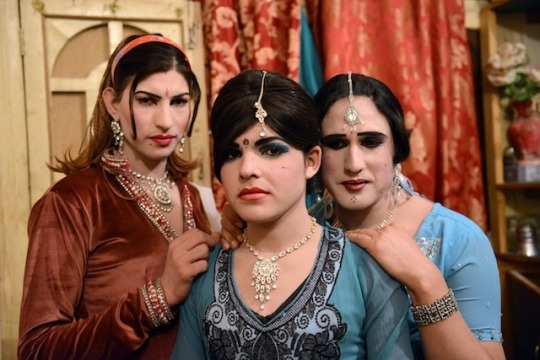
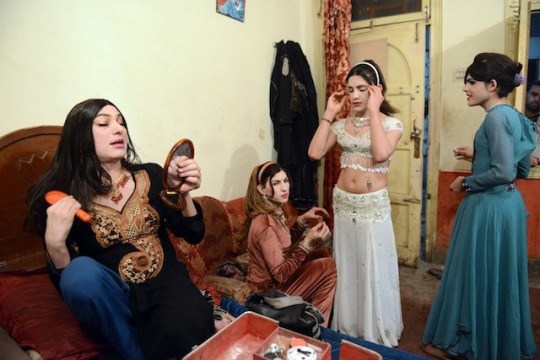
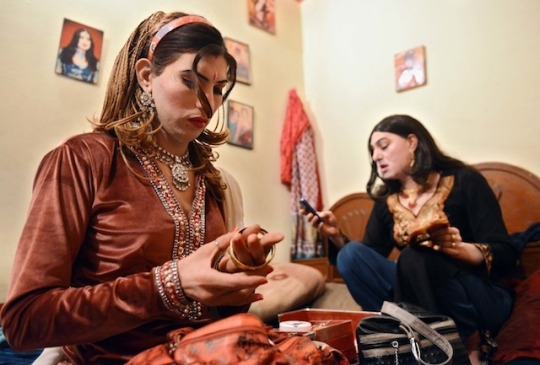
Pakistan's Transgender Community Is Hiding Out in a Hostile City
As Peshawar has come under increasing sway of an extremist view of Islam, its community of transgender hijras has been increasingly marginalized.
By Beenish Ahmed, 16/05/2014
Photos by Abdul Majeed Goraya
"My father used to beat me and ask, 'Why do you have to go around pretending to be a girl?'"
Now at 35, she says her cheeks burn and fists tighten if anyone refers to her as a man.
Khushboo, whose name means fragrance, classifies herself as a hijra, a South Asian gender designation that encompasses transgender and transexual people, as well as transvestites and eunuchs.
She has a different definition for herself and the estimated hundreds of thousands of other hijras across the region. "Our souls are female and our bodies are male," she says, dipping a rag into a red plastic pail filled with a chalky mixture of water and face powder. Surrounded by a group of several other hijras in a room they call their "office," Khushboo smears the dripping rag over her face and adds, "I've known I was a hijra since I was a child."
She used to wear her sisters' clothes. At 16, Khushboo slipped out of the house in one of their outfits and didn't return home for years. Along with another hijra, she settled in Peshawar, a city in northwestern Pakistan one night's drive from the costal city of Karachi where she'd grown up.
Peshawar has long been home to cultural traditions that insist on strict gender segregation, and the city has come under increasing sway of an extremist view of Islam in recent years. These intolerant, conservative beliefs are made brutally clear through the bombings and shootings that are now near-weekly occurrences. Taliban suicide bombers killed 85 worshippers at a church there last September, and militants killed thirteen people at a cinema showing pornographic movies in February. Lesser attacks are momentary blips on local news coverage featuring bloodied streets and blaring sirens.
Khushboo points to battered doors and broken windows around her. She says young men—"college boys" she calls them—wreak havoc on her and fellow hijras who are preparing for a dance performance later that night. Sometimes the men recite scripture and beat the hijras to shame them out of their profession as dancers, and other times they force them to dance or even rape them, she tells me.
Despite the extremism that has only further marred the city since her arrival nearly 20 years ago, Khushboo has an affinity for Peshawar because it's where she had a sort of rebirth as her new self.
Free from the abuse of her father and brothers, as well as the sense of dishonor she felt on behalf of her mother and sisters, Khushboo embraced a new life of openness—and was adopted into a new family.
"In this field we have mothers. We have gurus. We have uncles and aunts," she says, and then points to a girl who's rolling a spliff in the corner of the room. "She's my daughter. I'm a daughter of someone so she has a grandmother too. And," Khushboo adds, "She also has a father."
That last bit comes so quickly that I almost miss it. I inquire further about the girl's "papa" and Khushboo says, "Her father is married to someone else, but he loves me." She then goes on to explain what their relationship entails—and it's all very practical until it gets utterly tragic: "If I'm sick, he comes by and brings me medicine," she says proudly. "If I don't have money he drops some cash off. If I die, it's this man who will dress me up as a man and take my body to his house to carry out the cemetery. He might not explain the full story and just say that I was killed in the market or that there was some kind of shooting, but he's the one who will take care of the funeral."
I can't help but think that this grim possibility is one that Khushboo has discussed with her "husband"—and one that he too has come to terms with.
"In Pakistani society, there is a really strong [sense of] place and family," says Dr. Jamil Ahmad Chitrali, a professor of anthropology. "There is no alternative for anyone."
Based at the University of Peshawar, Chitrali has written about the city's hijra community. He says that by forging the same sorts of familial connections that they left behind, hijras create a social order that mimics the very society from which many of them fled.
"It's forcing all those revolutionary individuals who are against those binaries of man and woman to come into a structure which is reaffirming patriarchy," he says.
Pakistan's hijras have made some strides in recent years despite their rather isolated existence. In 2012, the Pakistani Supreme Court allowed for a "third gender" category to be added to national identity cards, which effectively gave hijras increased legal standing. It's because of this broader recognition that hijras could vote in that year's presidential election—at least five hijras even ran for office.
But the third gender classification has made little practical difference in Khusbhoo's life. "We live in a third world," she says, the difference between her life and that of a cisgender person just as stark as the difference between life in Pakistan, and say, Monaco.
And, she says, no matter what she does, she'll always be seen as different.
"Even if I give up dancing, everyone will still call me a hijra so what's the point? Why not do what I love?" She adds that even if she were to become a traveling evangelist, her family would still regard her with the same disdain. "I'm better off staying a hijra."
And that's the hardest thing that Khushboo has to face: her family. She got back in touch with them after five years of not speaking, and goes to see them in Karachi at least once a year. But when she does, she goes dressed as a man.
Though she moves about as a woman in Peshawar, Khushboo wears a black floor length, full-sleeved robe (or abaya), and a face covering (or niqab) that reveals only her eyes to hide herself from prying eyes. Even so, she's been thrown out of several houses by people who fear hijras will ruin their neighborhood.
While they occupy a marginalized space across Pakistan, hijras are probably worst off in Peshawar. In all of the other major cities in the country, they are frequent sites at traffic intersections or in shopping centers where they offer a prayer for a few rupees. Many passersby fear denying them might mean a curse and so will either oblige quickly or turn away completely.
I've spent a lot of time in Peshawar over the years, and have never seen hijras out in public the way they are in other cities. After speaking with Professor Chitrali, I learned that might be because hijras have a different role in the Pathan society that dominates the Peshawar area. In this part of the country, hijras aren't seen to have some sort of greater spiritual connection than cisgender people—instead, their role is celebratory. They're often asked to sing and dance at weddings and births.
"It's their performance which gives [a family] social recognition," Chitrali says, though the tradition is fading as weddings move from family houses into wedding halls. Some might have other professions—Khushboo says she has hijra friends who are lawyers and pilots and act cisgender in order to maintain their jobs, though they're free to "be themselves" with her and other hijras. Due to a lack of societal acceptance, many hijras live marginalized lives as low-income entertainers, but they've got a bit of a role as educators, too. Hijras sometimes teach—or even initiate—young men into sex. For many in Peshawar who live by strict religious and cultural codes that denounce almost any pre-marital interaction between the sexes as sinful, hijras provide a sort of in-between, or a "cushion," as Chitrali calls it.
"If you cross the domain of manhood into womanhood, that is against the culture, that is crossing your limits. But you can always move into the gray area, so this hijra community, in that sense, in a clear binary of man and woman among Pathans, [forms] a gray area." But he says that this "learning experience" is becoming less common with such how-to's readily available on the internet.
In Peshawar's increasingly religiously-motivated milieu, the presence of hijras—be they dancers or sex workers—is frowned upon and politicians vie for favor by pushing them out of their homes and worksites.
Seeing this, Malik Iqbal says he wanted to do something. "I sympathize with them because no one gives them any space," he tells me.
He rents out the office that Khusboo and her fellow hijras use to prepare for their dances.
"I didn't used to be on their side," Iqbal says. "Now I help them. I say they're humans too. We should have some empathy for that reason. Not just me, everyone should empathize with them as people."
But some believe Iqbal's connection to hijras goes beyond a shared humanity. Though he refuses to speak about it, Iqbal was arrested in 2010 for attempting to marry a hijra called Rani. Such a union would be illegal under Pakistani law, which only recognizes marriages between men and women. He has repeatedly denied the charge and claimed that police were trying to extort money from hijras at an event that wasn't a marriage but an innocent birthday party. Either way, the shock the story garnered reveals just how far removed everyday Pakistanis are from the hijra community. A big-grossing film called Bol, or Speak—released in 2011—may have helped some, but real connections like Iqbal's remain few.
And not everyone in close proximity to hirjas is sympathetic. Noor Illahi, who owns a grain shop down the street from the hijras' office, doesn't have a problem with the hijras themselves or even their work, but thinks they should find some other place to go. "My work has suffered because of them. The other storeowners and I, we think they should be given some place off to the side. It should be separate."
He's worked in his store for 15 years and says that sales have dropped fifty percent since the hijras set up shop next door a few years ago. "There are a lot of fights here now. They create quite a scene sometimes."
The raucousness has driven away his customers. Those who stop in the area are more interested in the hijras than the sacks of flour he has for sale.
"I'm not personally offended by them. But look," he says, pointing to a group of several white shalwar kameez-clad men loitering outside the hijra's building. "These poor people have earned just three or four hundred rupees all day ($3-4) and they'll come here and waste it all on them."
The men are all rickshaw drivers. One by one, they go on the record to deny being there to solicit sex. "We're just here to chit chat with them," one says while peering over his shoulder to see if any of the hijras have come out into the alley. "It's a totally innocent relationship that we have with them."
Back up in the hijras' office, the lights have gone out as a part of the rolling power outages that have frustrated Pakistanis for years. It might be another hour before they're ready to leave for their performance. When they do, they'll be cloaked in massive shawls and under the cover of night.
26 notes
·
View notes
Text
“Pakistan’s February 8th, 2024 Sham Elections” Under the Gun Point of the Corrupt to the Cores Army Generals, Election Commission, Politicians and Judges
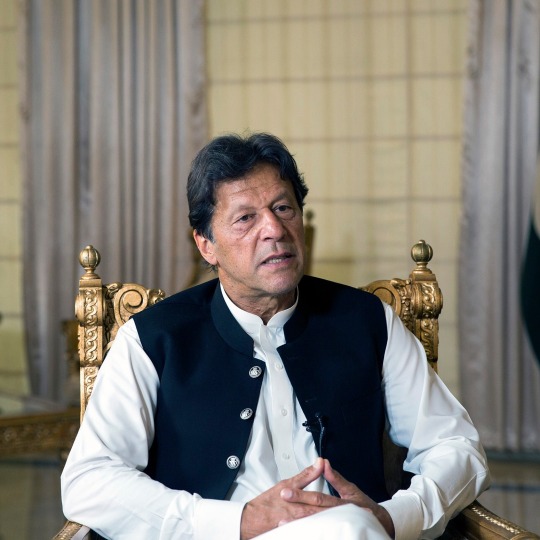
The One & Only AND The Legend of Legends: Imran Khan! Pakistan’s Most Popular Political Party PTI’s Most Popular Leader is in Jail Due to Bogus Politically Motivated Cases
A top Pakistani political party is subjected to a harsh crackdown ahead of national elections. Its members are harassed, abducted, and arrested. Media outlets are pressured not to cover any of the party’s activities, and critics of this repression are silenced. The party’s top leader is given a long jail sentence on the eve of the polls.
This was the situation for the Pakistan Muslim League-Nawaz (PML-N) in 2018. Today, the PML-N is contesting Pakistan’s Feb. 8 elections with no problems, and it is former Prime Minister Imran Khan’s Pakistan Tehreek-e-Insaf (PTI) party that is receiving this treatment. Hundreds of PTI supporters have been arrested, the party’s top leadership is hollowed out, and the already-imprisoned Khan received three new sentences within 10 days of Thursday’s vote.
Thanks to court rulings, the PTI is reduced to fielding candidates as independents, who are denied the use of the party’s symbol (a cricket bat) on the ballot in a country with a 40 percent illiteracy rate. The PTI’s plight is an especially intense manifestation of a long-running pattern in Pakistan: The all-powerful military uses a range of tactics to shape the electoral environment in ways that weaken the parties it doesn’t want in power.
What has happened in the lead-up to the Feb. 8 elections is not new, but the backdrop it has played out against may be unique. The country is facing a convergence of acute crises: economic stress so severe that the upper classes are feeling the pinch, upsurges in terrorism, worsening border tensions, and dangerous levels of political polarization. Pakistanis’ pessimism about the economy, elections, and safety is at the highest levels in years.
“Pakistan on Edge As ‘Old Corrupt to their Cores Dynasties Vie For Power’ and Populist Imran Khan Languishes in Prison Due to Baseless Politically Motivated Cases”
The confrontation between Khan and the military leadership has been aggressive and sometimes violent. Khan blamed the military for orchestrating his ouster in a parliamentary no-confidence vote in April 2022. After being targeted in an assassination attempt that November, he escalated his campaign against the military establishment, leveling allegations against senior security officials and calling them out by name—practically unheard of from a former prime minister.
After Khan was arrested last May on corruption charges, protesters attacked military facilities, including the General Headquarters building. Rarely had political violence taken such direct aim at Pakistan’s military, which has long held a sacrosanct status. The military dramatically ramped up its crackdown against the PTI. In turn, public anger with the military surged, fueling a crisis of confidence that runs deep: Some military officers have reportedly faced discipline for retaining support for Khan.
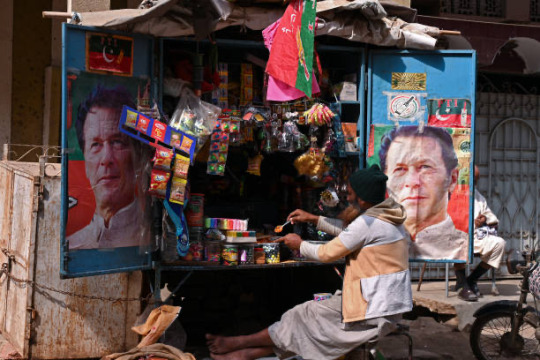
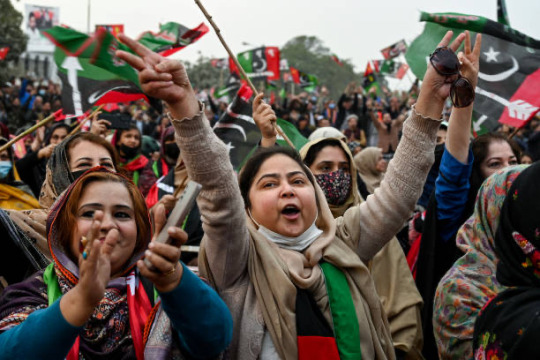
Social media has in part exacerbated this anger and polarization leading into the elections. PTI supporters have vented on online platforms, and some hard-liners have developed large followings by directing withering criticism at the military on social media. Many vocal PTI supporters have turned to anonymous accounts, fearing retaliation by a state that has restricted internet access during the party’s online campaign events. (The PTI cannot mobilize offline.)
The outcome of the elections on Thursday is unlikely to be stabilizing. The next government will probably be a weak and fractious coalition; if turnout is low, it will lack a strong mandate. The losers will bitterly reject the elections result, hardening public anger, especially among PTI supporters. Despite everything, Khan’s party is rallying its supporters with get-out-the-vote calls and contesting elections with independents on the ballot—but the cause is seemingly futile.
Keen to play a leading role in Pakistan’s economic recovery, the military is unlikely to retreat to the barracks after the elections. This could set the stage for a new crisis—especially if PML-N’s Nawaz Sharif, who sparred with the Army during his previous terms as prime minister, returns to power. Sharif’s relationship with the military has tended to blow hot and cold. Today, he is back in the military’s good graces: His experience likely makes the military think he can stabilize the economy—and he is a bitter rival of Khan.
Any fresh political tensions could distract policymakers from addressing critical social, economic, and security challenges, just as Khan’s confrontation with the military has. For many Pakistanis, these elections could be the latest sequel of a movie they prefer not to watch.
#Pakistan 🇵🇰#Pakistan’s Sham Elections#Pakistan 🇵🇰 Under Siege of Corrupt Army Generals#Boak Bollocks | Politicians | Judges#One & Only Imran Khan#Nawaz Shrif | N-League | Thief | Traitor | Looter | Money Launderer |Morally Bankrupted
1 note
·
View note